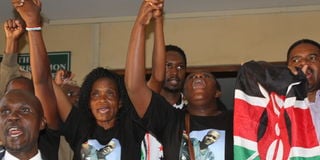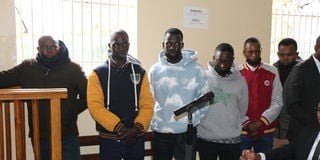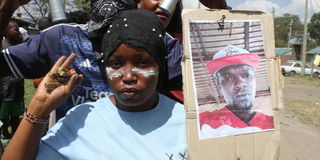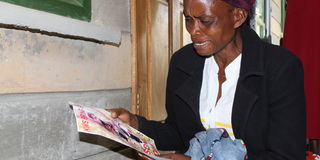Brian Odhiambo: Inside four-month fight for justice, and a mother who refused to quit

Elizabeth Auma (left) and Alvy Akello together with human rights activists chanting outside the courtroom on May 5,2025.
On Monda May 5, six Kenya Wildlife Service (KWS) officers linked to the disappearance of Brian Odhiambo were brought before a Nakuru court, where they were charged with abduction with intent to confine.
From the moment they stepped into the dock, all eyes were on the suspects. Throughout the proceedings, the courtroom—filled to capacity—listened intently.
For Brian’s family, the arraignment of the six individuals marked the beginning of a long-awaited journey toward justice—something that, just three months earlier, had seemed elusive.
That sentiment echoed across social media, especially among those who had followed the courtroom developments through videos shared online.

(From left) Francis Wachira, Alexander Lorogoi, Isaac Ochieng, Michael Kimaiyo, Evans Kipsang and Abdulrahaman Ali during their arraignment in a Nakuru Law court after they were charged with abduction of Brian Odhiambo on May 5,2025.
The story began with the mysterious disappearance of Brian Odhiambo on January 18 after he was whisked into, Lake Nakuru National Park by KWS officers, in broad daylight.
This triggered six days of protests in Kivumbini. At first, the scale of the unrest seemed baffling—how could the alleged abduction of one man ignite nearly a week of protests?
But beneath the surface, it became clear that the community’s frustration had been brewing for some time.
The demonstrations were fuelled by repeated reports of harassment and abuse allegedly carried out by those tasked with protecting the park—Kenya Wildlife Service rangers.

A protester holds bullet casings and a portrait of Brian Odhiambo during the demos on January 24, 2025.
Residents began speaking out about a disturbing pattern of misconduct: allegations of assault, rape, and bribery painted a grim picture of the relationship between the rangers and the local community.
For the protestors, this wasn’t just about Brian—it was about years of mistreatment. The demonstrations sent a clear and forceful message: enough was enough.
Attempts to obtain an official response from the KWS in the early days were met with silence. It wasn’t until the fourth day of protests that the agency released a statement, acknowledging public concern over the recent events.
“KWS is cooperating fully with all security agencies to establish the facts, ensure justice is done, and guarantee accountability. KWS officials involved in the matter have recorded statements with the Directorate of Criminal Investigations (DCI), and investigations are ongoing,” the statement read in part.
That statement marked the beginning of efforts to hold those responsible accountable.
On February 6, a ruling was delivered in response to a habeas corpus application—a writ requiring authorities to bring a detainee before a judge.
The application sought to compel the Directorate of Criminal Investigations, Nakuru East, and the Park Warden of Lake Nakuru National Park to produce Brian Odhiambo in court—dead or alive.
However, the application was unsuccessful. The judge ruled that Elizabeth Auma and the Independent Medico-Legal Unit (IMLU) had failed to demonstrate that Brian was in the custody of the respondents (the DCI and the park in charge).
To Brian’s family, the ruling felt like a dagger to the heart.

Brian Odhiambo's mother , Elizabeth Auma, wails at Nakuru court as she stares at her son's photo on February 6, 2025.
They had seen it as their last hope for justice. Overcome with emotion, they broke down in tears and disrupted court proceedings, bringing the High Court to a standstill for more than an hour.
Hopeless and uncertain of what lay ahead, the family returned to the Nakuru Law Courts 20 days later. This time, they requested a public inquest into Brian Odhiambo’s disappearance.
In response, the KWS dismissed the request in its affidavits, calling it a “fishing expedition.”
Although the magistrate did not fully grant the request for a public inquest, they ordered a comprehensive investigation into Brian’s case—a decision that, according to family lawyer Abuya Mogendi, was still a victory.
Brian’s mother, Elizabeth Auma, remained steadfast.
On March 20, during a public event in Shabab attended by Interior Cabinet Secretary Kipchumba Murkomen, she approached the CS personally to plead for justice on behalf of her son.
The CS responded firmly. He issued a warning to rogue KWS officers and promised Auma that the government would do everything in its power to ensure justice was served.
On April 30, Mtaa Wangu followed up with Elizabeth Auma to check on the progress of the case. She said the CS had assured her that everything was on track.
However, she voiced concern: the officers suspected of abducting her son were no longer stationed at Lake Nakuru National Park, potentially complicating efforts to trace and prosecute them.
“The CS assured me that the arm of the law is long and that all the officers involved will be held accountable, so I shouldn’t worry,” she said at the time.
Fast forward to the morning of May 3, the country woke up to the news that six KWS officers had been arrested in connection to the disappearance of Brian Odhiambo.
Will justice finally prevail? Only time will tell.


